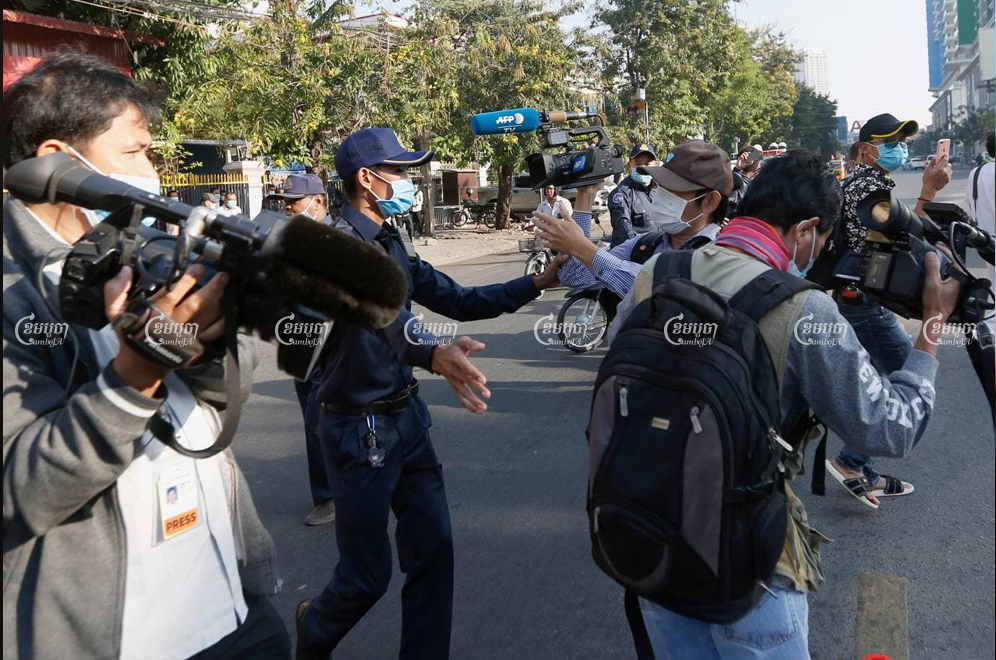Authorities doubled down on threats of legal action against reporters who “interfere” in police investigations after four media associations on Friday called for clarification of a new directive, but the scope of police powers remains unclear, journalists and advocates said.
Phnom Penh Municipal Police Chief Sar Thet announced on January 21 that journalists were banned from filming, recording and live-streaming police investigations and “other duties,” which media associations labeled “vague and broad” in an open letter published February 5.
The police chief’s announcement came three days after Information Minister Khieu Kanharith threatened journalists with arrest for collecting information in “prohibited areas.”
On Friday, Thet told CamboJA that the new directive does not supplant existing laws, adding that it was aimed at stopping reporters and citizens from interfering in police questioning of victims or suspects, particularly by using Facebook livestream to broadcast those events.
“We just ask journalists to not livestream when police officials are investigating or talk about what police officials are investigating in livestreams,” Thet said, adding that post-arrest livestreaming would be accepted.
In some cases, information broadcast over livestream had allowed suspects to evade arrest, he said, calling for journalists with information in criminal cases to share it with police, rather than make it public.
The new directive comes amid a spate of arrests of activists and increasing levels of harassment of journalists and human rights defenders documenting their protests and arrests, raising concern by reporters and media associations.
“In recent months, multiple journalists have experienced harassment and been told by authorities to stop photographing, recording and broadcasting live during protests and other events in which police were on duty,” four associations said in an open letter.
The directive could restrict the work of journalists, which is protected under Article 41 of the constitution and the 1995 Press Law, said the Cambodian Journalists Alliance Association (CamboJA), the International Federation of Journalists (IFJ), the Overseas Press Club of Cambodia (OPCC), and the Cambodian Center for Independent Media (CCIM).
“We call on the government to explain clearly this latest directive, discard all unnecessary orders, laws and directives that inhibit journalists’ work, and ensure that all journalists can exercise their rights to report freely and without fear,” they said.
As it stands, the new directive remains open to interpretation and could create further misunderstanding between reporters and authorities, said Pen Bona, president of the Cambodian Club of Journalists.
He said it was important for authorities to distinguish between professional, accredited media practitioners, who are protected by the Press Law and constitution, and non-journalists who used livestreams to broadcast information.
“It should not affect journalists because professional journalists need to investigate criminal cases, too,” he said. “We collect information from all parties, including police, and compare it before publishing.”
CCIM media director Ith Sothoeuth said that the directive could be interpreted as a threat to journalists and raised concerns about its implementation by low-level police or district security guards, who have been accused of using excessive force to break up protests.
“Whether its intended to be official or not, subordinates will use those instructions,” he said, calling once more for police and the Information Ministry to clarify the directive and how it would be implemented alongside existing laws.
Information Ministry spokesman Meas Sophorn told CamboJA that the directive was a reminder to journalists to respect the role of authorities.
“The information minister confirmed that, in cases where journalists abuse the authority of authorities, the authorities have the right to take action,” he said. “The point is not to shut down freedom [of information].”
Freelancer reporter Aun Chhengpor said that journalistic freedoms have been decreasing steadily for three or four years in Cambodia, making the job of collecting and sharing information that is in the public interest increasingly difficult.
As an example, he said, on January 14, authorities ordered him inside Olympic Stadium, across the road from the Phnom Penh Municipal Court, which has been the scene recently of clashes between officials and those protesting against a series of trials related to the outlawed opposition party.
“Sometimes, there are arguments between family members of defendants and security guards or police officials, and photographers capture images of that,” he said.
The new directive seems not to be in line with existing laws and, left open to interpretation, was dangerous, he said, adding that he had never heard of a police investigation failing due to interference by journalists.
“I request the authority to withdraw the directive,” Chhengpor said.








